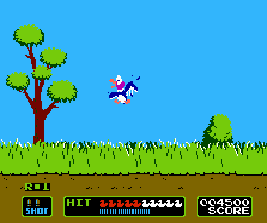
DUCK HUNT: A METAPHOR TO HELP US UNDERSTAND HOW SCREENS ACT AS SENSORS.
I've spent the last couple weeks thinking about the video game Duck Hunt. I think Duck Hunt makes for a pretty good metaphor for what some parts of the new media environment are all about.
Duck Hunt appears, on the surface, to be simplicity itself. The player uses not a joystick, but a controller that looks like a rifle. Aiming this rifle at the screen, the player attempts to shoot a duck that flies across the screen. When a duck is successfully shot down, a hilarious-looking (and strangely gleeful) dog picks up the duck, retriving it for you. So far, so good.
Like any other twelve-year-old video game fanatic in the early eighties, the following question occurred to me: how the hell do the makers of Duck Hunt (Nintendo, I believe) configure a screen that is capable of registering the shots of the rifle? How does this screen know what is a hit and what is a miss? Is this some kind of special screen that can act as a sensor, as well as a monitor? This question became even more pressing when Duck Hunt was introduced as a home version, so that normal televisions could could 'register' the shots of the rifle on the screen. Were tv's suddenly made capable of acting as video game rifle-sensors?
Of course, the monitors/tvs never acted as 'sensors'. Instead, the process was the exact reverse of what I had assumed, and was the reverse of what shooting a duck is all about. The Staight Dope's Cecil Adams deals with this quite well:
You shoot at a duck, which appears on an ordinary TV screen. The gun is connected to the game console; pressing the trigger blackens the screen, then causes a duck-shaped white target to appear momentarily. If your aim is true, a photo sensor in the gun detects the shift from dark to light, and bingo--dead duck. In short, the TV emits the light pulse and the gun detects it, not the other way around.
So, what seems like a process of throwing out, or 'shooting,' information is actually a process of pulling it in. This leads me to the metaphor that's been haunting me for a couple of weeks. It goes like this: we think the media are only there as passive screens/speakers/whatever. But, much like the rifles in duck hunt, they're not just emitting information and culture. They're also collecting information, about us. So, as we consume media products, increasingly we find that information about us is being used to create algorithmic profiles of what we are like. This is then used to construct increasingly complex models of media consumption patterns. The process is described in detail in a number of newer sources in media studies. I think Oscar Gandy's The Panoptic Sort (1993) and James Beniger's The Control Revolution (1986) were both prophetic in detailing how much this kind of process will come to matter. Many other scholars (too many for this very tired scholar to describe right now) have stepped in to apply similar ideas to the internet and to the information economy.
But for me it's still all about Duck Hunt. What we think is emitting, is in fact collecting.

1 Comments:
Good
Post a Comment
<< Home